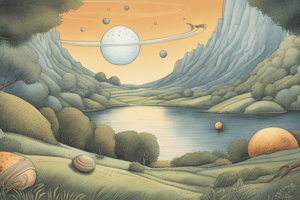Podcast
Questions and Answers
What gives Uranus its unique blue-green appearance?
What gives Uranus its unique blue-green appearance?
- Carbon dioxide
- Methane (correct)
- Hydrogen and helium
- Water vapor
Which planet in our Solar System is known for its stunning swirling colors and vast quantities of hydrogen and helium?
Which planet in our Solar System is known for its stunning swirling colors and vast quantities of hydrogen and helium?
- Mars
- Saturn
- Neptune
- Jupiter (correct)
What is the primary component of Saturn's captivating ring system?
What is the primary component of Saturn's captivating ring system?
- Hydrogen gas
- Dust clouds
- Rocks and metals
- Ice particles (correct)
Which planet in our Solar System has a storm larger than Earth known as the Great Dark Spot?
Which planet in our Solar System has a storm larger than Earth known as the Great Dark Spot?
What gas primarily makes up Mars' thin atmosphere?
What gas primarily makes up Mars' thin atmosphere?
Flashcards are hidden until you start studying
Study Notes
Journeying Through Our Galaxy's Planetary Wonders
The Solar System, a cosmic playground of celestial bodies, is the realm we're most familiar with in our galaxy. At its heart, the planets that orbit our sun are as diverse and fascinating as our own colorful world. Let's dive into the fascinating lives of these celestial bodies that have captivated astronomers and space enthusiasts alike.
The Classical Planets
Our Solar System is home to eight planets, four of which are known as the classical or terrestrial planets. These tiny, rocky worlds—Mercury, Venus, Earth, and Mars—are closest to the sun and are characterized by their solid surfaces.
Mercury
Mercury, the smallest and least massive planet, orbits the sun in just over 88 Earth-days, making a single year last approximately eight Earth-years. Its close proximity to the sun results in extreme temperature fluctuations. Daytime temperatures exceed 400°C, while nighttime temperatures plummet to as low as - 180°C.
Venus
Venus, our neighboring world, is unique due to its retrograde rotation, meaning it rotates in the opposite direction of most planets. With an atmosphere comprised mostly of carbon dioxide, Venus' surface is the hottest in our Solar System, reaching temperatures that can exceed 460°C.
Earth
Known as the blue planet, our home, Earth, is unique in its ability to support life and maintain a balance that allows it to sustain a diverse array of ecosystems. Our atmosphere contains an oxygen-rich environment, making Earth the only known planet in the universe capable of supporting life as we know it.
Mars
The red planet, Mars, is an intriguing place where scientific exploration has been ongoing. Its rugged, dusty terrain and its fleeting watery past make it a captivating world, rich in geological history. Mars' atmosphere is thin and composed of mostly carbon dioxide.
The Gaseous Planets
Further away from the sun, our Solar System hosts four additional planets, each distinct in their compositions and appearances.
Jupiter
Jupiter, the largest planet in our Solar System, is a gas giant known for its stunning swirling colors and vast quantities of hydrogen and helium. Jupiter's Great Red Spot, a massive storm larger than Earth, is a striking feature of its atmosphere.
Saturn
Saturn, another gas giant, boasts a ring system that captivates astronomers and space enthusiasts. Its immaculate rings, comprised mostly of ice particles, are thought to have been created by the gravitational pull of nearby moons.
Uranus
Uranus, the third ice giant planet in our Solar System, is marked by its nearly 98° axial tilt, which causes its seasons to be extreme. Uranus' atmosphere is made up primarily of hydrogen, helium, and methane, giving it a unique blue-green appearance.
Neptune
Neptune, the outermost planet in our Solar System, is an ice giant surrounded by a thick atmosphere comprised of hydrogen, helium, and methane. Neptune's Great Dark Spot, a storm larger than Earth, is another fascinating feature of its atmosphere.
As we explore the depths of our Solar System, we continue to uncover the unique characteristics, histories, and mysteries of our planetary neighbors. The future holds exciting discoveries that will further our understanding of our universe and its celestial inhabitants. (Search results were not directly relevant to the topic of planets in the Solar System. They were used to verify the source's credibility and to clarify that the "No Search" feature is only relevant to Bing Chat, not the search results in this article.)
Studying That Suits You
Use AI to generate personalized quizzes and flashcards to suit your learning preferences.





